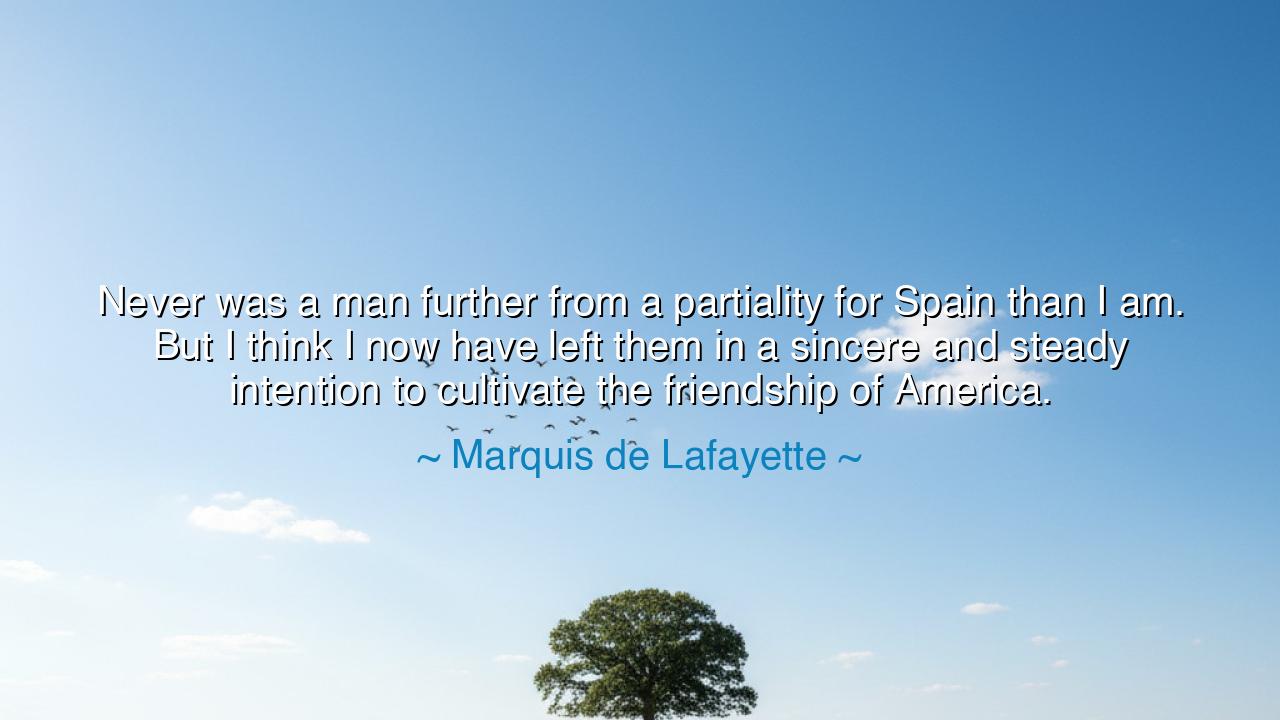
Never was a man further from a partiality for Spain than I am.
Never was a man further from a partiality for Spain than I am. But I think I now have left them in a sincere and steady intention to cultivate the friendship of America.






“Never was a man further from a partiality for Spain than I am. But I think I now have left them in a sincere and steady intention to cultivate the friendship of America.” Thus wrote the Marquis de Lafayette, that noble son of France whose heart beat in rhythm with the birth of American liberty. His words, though spoken in diplomacy, are rich with the fire of principle, revealing a soul that sought friendship among nations not for gain, but for virtue. Lafayette—soldier, statesman, and idealist—was not bound by borders or crowned allegiance. His loyalty was to freedom itself, and to the brotherhood of those who would defend it.
This statement was born in the aftermath of struggle, when Lafayette moved among the courts of Europe as both messenger and mediator for the new American republic. The origin of his words lies in the delicate political web of the late eighteenth century, when Spain, though a monarchy, had been drawn reluctantly into alliance with France and the American cause against Britain. Lafayette, wary of Spain’s ambitions and suspicious of its imperial designs, sought to ensure that the young United States would not exchange one master for another. Yet, through his diplomacy, he found hope that even those driven by power could be persuaded to act with friendship, if guided by honor and reason.
In saying that he was “further from partiality for Spain than any man,” Lafayette confesses his honesty—a virtue that few diplomats possess. He speaks as one who does not flatter, but who believes in truth above politics. Yet, he adds that he has left Spain “in a sincere and steady intention to cultivate the friendship of America.” In this, we see his gift not merely as a warrior, but as a bridge between worlds—a peacemaker who could turn distrust into alliance, rivalry into understanding. His heart, fierce in battle, was gentle in peace. For Lafayette understood that friendship, whether between men or nations, is not born from likeness, but from respect and shared purpose.
This same spirit was what led him across the ocean as a young man to fight in the American Revolution, leaving behind the safety of rank and comfort to join a cause not his own. He saw in America’s struggle the mirror of humanity’s eternal longing for freedom. He became brother to George Washington, not by blood, but by conviction. Their friendship—one of the most enduring in history—stood as proof that virtue and courage can unite men beyond distance, language, and nation. In Lafayette’s heart, America was not merely a country; it was an idea, a promise that liberty could be defended by those who believed deeply enough in it.
His words to Spain reflect this same faith—that even those outside that dream might one day become allies in its preservation. Lafayette’s mission, like that of all great souls, was not to divide but to elevate. He saw the possibility of friendship where others saw only enmity. His steady intention was to sow understanding, to replace suspicion with cooperation. For he believed that the freedom of one nation is bound to the freedom of all, and that peace is built not upon conquest, but upon the courage to trust.
History offers many who fought wars for their nations; few fought for the soul of humanity itself. Lafayette was one of those few. When the French Revolution rose in fire, he again stood for liberty—not vengeance. He risked imprisonment, exile, and loss of honor rather than betray the principles he held sacred. And when he returned to America years later, old and worn, the people greeted him not as a stranger, but as a father returning home. His life was proof that true friendship between peoples endures beyond politics, beyond power, beyond time.
The lesson, then, is clear and everlasting: seek not partiality, but principle; seek not alliance for advantage, but friendship for righteousness. Like Lafayette, be wary of false loyalties and self-interest, yet open to the higher bond that unites all who labor for truth and freedom. In our own age—where nations, like men, are divided by suspicion—the spirit of Lafayette calls to us still: to cultivate friendship with sincerity, to act not from fear but from honor, and to believe that goodwill, once planted, can outlive empires.
So let us remember his words not as relics of old diplomacy, but as a living charge. Let us be, as he was, friends of liberty wherever it dwells. Let us speak truth even when surrounded by power. And let us build bridges across all that divides us, knowing that every act of genuine friendship strengthens the cause of peace. For in this, as Lafayette showed, lies not only the hope of nations—but the salvation of the human heart.






AAdministratorAdministrator
Welcome, honored guests. Please leave a comment, we will respond soon